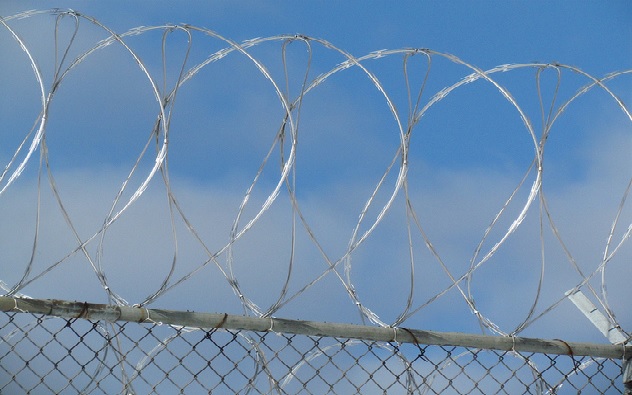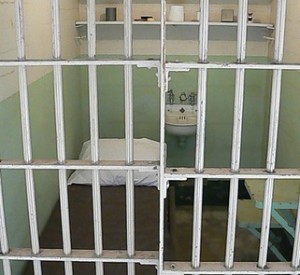Denying prisoners the vote creates a barrier to their reintegration into society
Parliament is currently considering how to relax the UK’s restrictions on prisoner voting, which have been deemed in breach of the European Convention on Human Rights. In this post Nicola Lacey argues that our ongoing failure to extend voting rights to prisoners creates a powerful symbol of their exclusion from full membership of society.

Russia, Bulgaria, Hungary, Estonia and Georgia place blanket bans on prisoner voting. Credit: Kate Ter Haar (CC BY 2.0)
Over the last several months, a parliamentary Joint Committee has been hearing evidence on the Draft Voting Eligibility (Prisoners) Bill. The Bill is a (tardy) response to the judgment of the European Court of Human Rights’ in Hirst v UK (2005), which held that this country’s provision that prisoners (other than those on remand or serving sentences for contempt of court) lose the vote while serving their sentence is in breach of Article 3 of Protocol 1 of the European Convention. The Bill sets out three options: extension of the franchise to prisoners serving a sentence of less than 4 years; extension of the franchise to prisoners serving 6 months or less; and a restatement of the existing law.
The question of prisoners’ eligibility to vote poses a very real challenge for legislators given the mismatch between the apparent strength of public feeling against extending the franchise and the European Court of Human Rights’ statement of this country’s international obligations. As a criminal justice scholar rather than a human rights lawyer, my evidence to the Committee concentrated on the case for allowing prisoners to vote rather than on that of the best interpretation of our obligations under the European Convention. In response to the Committee’s concerns about national sovereignty, however, I noted that, given the emphasis in both Hirst and, particularly, later cases such as Scoppola v Italy (2012) on the margin of appreciation remaining to this country in determining how to meet its Convention obligations, there is little reason to think that the European Court of Human Rights has overstepped its proper role.
I argued that there is a strong case for following the example of many of our European neighbours, and of several Commonwealth countries, in extending the vote to the vast majority of prisoners. My reason for holding this view is that the denial of the franchise is a powerful symbol of the exclusion of offenders from full membership of society, and that the knock-on effects of this sort of exclusion is one of the main barriers to the successful reintegration of ex-offenders into society following release. Whether or not there is evidence that voting contributes to rehabilitation and reintegration, there is reason to avoid framing our criminal punishments in such a way as to foster the stigmatisation of offenders. For stigmatisation which impedes later reintegration implies significant costs not only for former offenders but for potential victims of crime – in other words, for all of us.
One useful way of looking at the issue is to ask ourselves which group of countries we would like to belong to: the Commonwealth countries like Canada and Australia, which have rejected the argument that criminal conviction per se forfeits the right to vote, along with European and Nordic countries like Denmark, Ireland, Finland, Spain, Sweden and Switzerland, or France and Germany, which remove the vote only under very restricted circumstances, and only at the sentencing stage; or with Russia, Bulgaria, Georgia, Estonia and Hungary, which impose blanket bans on prisoner voting. It is worth noting that the two groups represent not only very different traditions in terms of human rights compliance, but also systematic differences in criminal justice, with the Nordic and north European countries in particular combining prisoner voting with significantly lower levels of punishment than we have come to expect in this country, while enjoying similar or lower levels of crime.
There are two ways in which an argument justifying prisoner disenfranchisement might be framed.
The first argues that disenfranchisement is an appropriate part of the relevant punishment for particular (or all) offences: someone who commits a criminal offence – or one of a particular quality, or degree of seriousness – should forfeit their full civil rights because of a violation of the social contract, returning to full membership of the community only when the full term of punishment has been served. This argument has a certain intuitive plausibility. But it does not explain why it should be only prisoners, rather than all offenders, who forfeit the vote. And it has baleful practical side-effects. As several witnesses pointed out, one of the implications of applying disenfranchisement to prisoners is that it removes from the electorate a disproportionately high number of certain ethnic groups, notably black men. And when we take into account that the prison population as a whole represents a very skewed demographic – and in particular represents the most disadvantaged sector of the offending population, as judged in terms of factors like poverty, poor education, homelessness, mental health problems and the experience of abuse or neglect in childhood – it follows that the disenfranchisement of prisoners, overall, serves to exacerbate what is already a sense in which many prisoners are socially disenfranchised at the time of their offences.
This is not to take away from their responsibility for their offences: it is not to deny the harm and suffering which they may cause, and the distress of their victims; nor is it to deny the justice of holding them to account. But, in deciding how to respond to those offences, those demographics should nonetheless be taken into account. They may explain, for example, the indifference to the vote which persists among many prisoners. But this is not a reason to think that depriving them of the vote doesn’t matter. On the contrary, it underlines the huge challenge which we face in integrating and including many offenders within society. To continue with disenfranchisement, in other words, amounts to giving up on the project of social inclusion, and to risk a drift towards ever greater polarisation and alienation. We have only to look at the USA – where an extensive, if uneven, practice of prisoner and indeed felon disenfranchisement has been practised for many years – to see the costly and divisive consequences of such a system. By contrast, if we look at our European and Nordic neighbours who allow most prisoners the vote, we also see countries with significantly more moderated penal systems and with better outcomes across a range of social indicators including equality and literacy.
The second argument for depriving prisoners of the vote suggests that the circumstances of incarceration are such as to take the vote away by necessary implication. The fact that remand prisoners and those imprisoned for contempt already vote makes this a hard argument to sustain on any practical level. It has been argued, though, that the circumstances of dependence on the executive, and the restricted association and movement implicit in imprisonment, are such that prisoners are unable to participate in the practices of civic involvement which ideally underpin the vision of citizenship which finds its ultimate expression in the casting of a vote (see Peter Ramsay’s ‘Faking Democracy with Prisoners’ Voting Rights’ ).
This argument deserves to be taken seriously, but I would reject it for two reasons. The first is that the majority of prisoners are incarcerated for less than the length of a full parliament, and are hence able to exercise their full rights of political participation for much of that period. Disqualification therefore produces arbitrary results: it can have a different impact on people with identical sentences. The second is that prisoners retain access to news media and to means of communication both within the prison and, albeit subject to some restrictions, with those outside, and are therefore capable of continuing their lives as citizens albeit within a somewhat restricted context. Prisons can be, and sometimes are, places where vigorous political debate goes forward. To claim that this does not qualify as a form of civic engagement is a throwback to the pre-modern – and in my view inappropriate – idea that prisoners suffer a form of ‘civic death’.
We of course hope that most criminal offences on the statute book define serious harms and wrongs for which punishment is appropriate. But it is perhaps worth reminding ourselves that, less than 50 years ago, various forms of sexual conduct which we today regard as legitimate were criminalised. The idea that, say, a man imprisoned for what was then the offence of having sex with another man should have been deprived of any political voice in the run-up to the enactment of the Sexual Offences Act 1967 seems repugnant. If we believe in the robustness of our criminal law, we should have the confidence to allow those who may disagree with us to participate, politically, even if we retain our right to punish them where their disagreement takes the form of breaching the law.
Note: This post represents the views of the author, and does not give the position of Democratic Audit or the London School of Economics. Please read our comments policy before commenting. Shortlink: https://wp.me/p3F3ol-r1
 Nicola Lacey is School Professor of Law, Gender and Social Policy at the London School of Economics. Her research is in criminal law and criminal justice, with a particular focus on comparative and historical scholarship. She works on the development of ideas of criminal responsibility in England since the 18th Century, and on the comparative political economy of punishment. She recently gave evidence to the Joint Committee on the Draft Voting Eligibility (Prisoners) Bill.
Nicola Lacey is School Professor of Law, Gender and Social Policy at the London School of Economics. Her research is in criminal law and criminal justice, with a particular focus on comparative and historical scholarship. She works on the development of ideas of criminal responsibility in England since the 18th Century, and on the comparative political economy of punishment. She recently gave evidence to the Joint Committee on the Draft Voting Eligibility (Prisoners) Bill.
Inset image: Tim Peace (CC BY 2.0)






 Democratic Audit's core funding is provided by the Joseph Rowntree Charitable Trust. Additional funding is provided by the London School of Economics.
Democratic Audit's core funding is provided by the Joseph Rowntree Charitable Trust. Additional funding is provided by the London School of Economics.